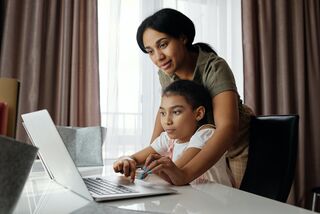Parenting
The Paradox of Pandemic Parenting
How much family time do we really need?
Posted March 24, 2021 Reviewed by Gary Drevitch
Key Points:
- A growing body of research shows that the costs of the pandemic have been borne unequally by women.
- Women are more likely to have lost their jobs, and even if they are working full-time at home, they remain more likely to take on the bulk of the housework and the oversight of children's remote learning.
- It is widely assumed that having a mother at home more benefits children, suggesting a possible silver lining. But research shows that when families, and particularly mothers, struggle, so do their children.
by Barbara J. Risman, Kathleen Gerson, Jerry Jacobs and Jennifer Glass
As we pass the one-year anniversary of the ongoing pandemic, many American families have been spending more time together, because of sheltering in place, than at any time in recent history. Today’s family togetherness is not even punctuated by playdates or, in many places, by attending school. Parents, but mostly mothers, whose paid work cannot be done from home, are being pushed out of the labor force to care for children who need supervision at home to do their online school work.
Mothers are providing the lion’s share of the work it takes to manage a family when children have nowhere to go for daycare while brick and mortar schools are out of reach. Our research points to three conclusions:
- First, while some men are doing more childcare and housework than they were before the pandemic, most are still not doing their fair share. As the amount of domestic work has risen, women are doing even more proportionally than men. Our research suggests that this is true even among younger parents, whom many hoped would find a way to finish the gender revolution.
- Second, mothers are taking the primary responsibility for home-schooling when their children are learning online. Four out of five mothers said they were spending more time homeschooling than their male partners, while only 45% of the men claim to have spent more time on it than their wives.
- Third, as a consequence of this unequal division of labor, some women are working fewer hours or dropping out of the labor force entirely. Of course, women are also much more likely to have left the labor force because their jobs have disappeared. We are in a “shecession,” and the women most hurt by disappearing jobs are women of color.

What are the implications for children? Those conservatives who have always thought women belong in the home might have predicted that children would do better with more parental time invested in their well-being. Perhaps, according to this logic, an unintended silver lining of the pandemic is that parents, especially mothers, are spending more time with their kids. Yet a long tradition of family research suggests this is not likely to be the case. If the past provides any lessons for the future, the increasing demands on women at home during the pandemic will undermine rather than enhance children’s well-being. This may be counterintuitive, so let us explain.
The vast majority of families depend on mothers’ incomes to support their children’s needs. Among households with children, 64% depend on a mother who is either a primary or co-breadwinner. Needless to say, when mothers are forced to reduce their paid work hours or withdraw from the labor force altogether, the family suffers economically. In single-parent households, a job loss can mean facing eviction and food insecurity. Even the loss of one parent’s job may lead to parents’ inability to provide the basics. At the moment, families require technology and high-speed internet for remote learning. The children of families already struggling will be hurt the most by the arrival of increased financial hardship.
As perilous as the situation may be, the challenges are not limited to struggling families. Even in financially secure households, parental stress takes a toll on children. Early research on the health effects of the pandemic go far beyond COVID-related illness. An epidemic of stress is also taking place among parents, particularly mothers, and it extends beyond national borders. Reports from Australia, the UK, and the U.S. show that the balancing act of working for pay with the loss of professional child care and classroom instruction has created serious stress and mental health struggles. New research in the U.S. shows that the increased workload among mothers is contributing to marital discord and women’s declining mental health. A long tradition of research shows that parental mental health, and especially maternal mental health, influences child health and well-being. Children whose parents are depressed are more likely to cheat, bully, and be disobedient, or to be fearful or feel worthless and withdrawn. Very simply, unhappy parents lead to unhappy children. Such consequences can last a lifetime.
But the effects of a mother’s job loss go beyond even that. Children of employed mothers enjoy numerous benefits, including higher academic achievement, greater career success, and, for daughters, more non-traditional career choices and greater independence and assertiveness in building their lives. Our research and that of others have also found that children with employed mothers perceive a range of benefits, including greater financial stability, more satisfied parents, and positive role models to emulate. The prospect of a reversal of 40 years of movement toward women’s equality in the labor force poses the risk of enduring effects on children that may last well beyond childhood. While leaving the labor force may lower the short-term stress of a parent, the long-term consequences may be children who doubt that girls will have or deserve equal opportunities at work or home.
No one can wave a wand to end the pandemic today. Vaccines are here but health officials tell us to continue our vigilance. We need policies to encourage gender equity during this hard time. We need policies that encourage fathers to do their fair share, protect all workers from discrimination based on caregiving responsibilities, provide child-care assistance, fund supervisors for children who must learn online, and make schools and childcare centers safe again. We must provide an infrastructure of care that makes it possible to earn a living when you are a parent or anyone who cares for a dependent.
We also need to take action in our personal lives. If you are a parent with a partner, think about who is doing the extra caretaking work during the pandemic. If you are partnered and your home is now both your workplace and your children’s school, have you sat down and had a hard conversation about the distribution of the extra labor that has to get done? Pretend you are out of the house, at work, and one co-worker isn’t doing his share. Do you just shrug your shoulders and adapt, or do you call him out? It’s time men are held accountable to be equal parents and fair partners. If you are an essential worker and your children are at home, do you and your partner talk about how to manage this ongoing crisis or does it always somehow become the mother’s problem? And if you are a single parent, you are truly a hero. Find yourself another single parent and perhaps create a Covid bubble in which you can share some of the extra work. Life has changed dramatically. Let’s make sure women are not the ones to carry the extra load.
Covid has revealed, once again, that gender matters. It’s up to us, and our elected officials, to make sure that men share the care load and that no parent, mother or father, does it alone. We also need the governmental assistance that began this week with checks in the mail, so that all families can come through this crisis with our children ready to succeed in their post-pandemic lives.
I am thrilled to co-author this column with colleagues with whom I am studying the effects of the pandemic on families.
An earlier version of these ideas was published on Northwestern University's Lost Generation C Project website.




